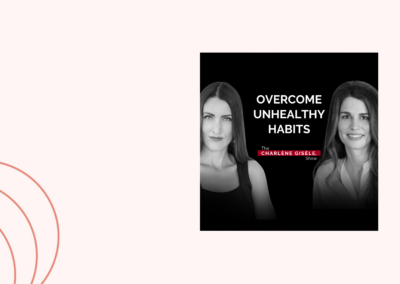We recently spoke with the lovely Jenya Di Pierro, a professional herbalist and a naturopath with a qualification in herbal medicine from the College of Naturopathic Medicine about how to create healthy sleep habits. Jenya also founded Cloud Twelve, London’s leading wellness and lifestyle club.
Jenya focuses on enabling the body’s self-healing mechanism through the power of plants and herbs. Her mission is to give people the option to use plants and feel their huge regenerative power and see how much calmer, happier and more balanced they can be.
Obtaining good sleep hygiene is important for both physical and mental health. Establishing healthy sleep habits can significantly improve our quality of life and even help with a variety of health disorders. Here are Jenya’s 10 sleep hygiene tips to help achieve a good night’s sleep.
10 Ways to Improve your Sleep Hygiene
1. Watch what you eat and drink, and when
It’s hard to get to sleep at night on an empty stomach, but dinner several hours before bedtime is usually enough to hold you over. Some people sleep better if they have a small snack before bed, but you want to avoid large meals late at night.
Big meals, although they can make us sleepy, can often disrupt sleep a few hours later. Plus, sleeping after a large meal can make acid reflux worse in people who suffer from that condition.
A more nutritious diet supports higher-quality sleep and improves sleep health. If you want to sleep better, eat better. But when deciding on dinner and your bedtime snack, it’s especially important to incorporate foods that are known to promote healthy sleep, while avoiding ones that do the opposite.
Fortunately, the list of the best foods for sleep is a long one, including yoghurt, oats, nuts, milk, rice, cherries, bananas, and much more.
One of the best Ayurvedic recipes that promotes restful sleep is Golden milk with Ashwagandha.
How to make Golden Milk with Ashwagandha
INGREDIENTS
- 1 cup milk, or unsweetened non-dairy milk
- 1 tsp ashwagandha powder
- 1/2 tsp cinnamon powder
- 1 tsp turmeric powder
- 1 (1/2-inch) piece of organic ginger unpeeled, thinly sliced
- pinch of black pepper (increases bioavailability or turmeric)
PREPARATION
Whisk milk, or non-dairy milk, cinnamon, turmeric, ginger, pepper, and ashwagandha in a small saucepan; bring to a low boil.
Reduce heat and simmer for about 5 minutes. Alternatively use a milk frother to whisk the milk and mix the powder into it. (Best non-dairy milk for frothing is Oatly Oat Drink Barista Edition)
2. Avoid/limit any stimulants in the evening
Caffeine and alcohol both disrupt sleep and are key factors in poor sleep hygiene. While alcohol may make you drowsy and induce sleep initially, it disrupts your sleep in the latter part of the night – preventing you from getting essential amounts of REM and deep sleep.
On the flip side, caffeine intake stimulates you, therefore it should be avoided a few hours before you go to bed to ensure good sleep.
3. Exercise during the day
What you do during the day, several hours before bedtime, can have a big impact on your sleep. Regular exercise improves your overall health, and it helps physically tire your body by the time bedtime arrives.
However, rigorous exercise should be avoided at night, ideally 3 hours before bedtime. It energises you and makes you feel awake which means you will have more trouble falling asleep.
4. Work with the cause of your stress
If you do not work with what causes you stress through a mental wellbeing practice like Sophrology, doing cognitive therapy or manifestations, it will often come to haunt you in your dreams or wake you up in the middle of the night around 3-4 am when negative emotions and fears tend to heighten.
To work with fears you can do one of the following:
- Accept rather than fight it. Imagine it happening 10 times stronger than your worst fear, accept the outcome. If you truly accept it, the fear will soon go away.
- Create a list of alternative options if your fear materialises. There are often a lot of things you can do to correct, improve or even prevent the outcome. The longer your list the more in control you are going to feel and fear will stop chasing you.
5. Make sure your room is completely dark when you sleep
A key tip to improve your sleep is to reduce exposure to bright or natural light at night time. Light stimulates a nerve pathway from the retina in the eye to an area in the brain called the hypothalamus.
There, a special centre called the suprachiasmatic nucleus (SCN) initiates signals to other parts of the brain that control hormones, body temperature and other functions that play a role in making us feel sleepy or wide awake.
Once exposed to the first light each day, the clock in the SCN begins performing functions like raising body temperature and releasing stimulating hormones, like the stress hormone, cortisol. The SCN also delays the release of other hormones like melatonin, which is associated with sleep onset, until many hours later when darkness arrives.
Therefore, if you suffer from severe sleeping problems, other sleep tips we recommend include using an eye mask and installing heavy curtains in your room to help you stay asleep and stick to a consistent sleep schedule for good sleep hygiene.
6. Turn off your iPad or other electronic devices at least an hour before going to sleep
Electronic devices emit blue light which suppresses our natural production of melatonin. So even if we know we are tired and need to go to sleep, our brain is getting the opposite message. Avoid watching tv close to bedtime for better sleep. You can continue to use sleep aid applications but make sure the display is dimmed to help you fall asleep.
7. Start going to sleep around 10 pm when melatonin production is at its peak
Melatonin is a natural sleep hormone made by your body’s pineal gland. During the day the pineal is inactive. When the sun goes down and darkness occurs, the pineal is “turned on” by the SCN and begins to actively produce melatonin, which is released into the blood.
Usually, this occurs around 9 pm. If you fall asleep after 2 am, you would have missed the peak in melatonin production, which would affect your sleep quality.
Factors inversely affecting melatonin production include age, shift work, alcohol consumption, evening exercise, caffeine, pharmacologic agents such as antidepressants, beta-blockers, and non-steroidal anti-inflammatory drugs (NSAIDs).
Additionally, melatonin is a naturally occurring anti-oxidant and protects against DNA damage acting as a scavenger of free radicals, so don’t miss out on its anti-ageing effect amongst other benefits.
8. Establish a regular relaxing bedtime routine
A regular nightly routine helps the body recognise that it is bedtime and improves your sleep hygiene. This could include relaxing activities such as taking a warm relaxing bath with essential oils or Epson salt, reading a book, or practising Sophrology.
9. Make sure that your sleep environment is pleasant
A comfortable mattress and pillows are essential for better sleep hygiene. The bedroom should be a cool, comfortable temperature – between 16C and 19C degrees – for improved sleep.
Consider using blackout curtains, eye shades, ear plugs, “white noise” machines or soothing music, humidifiers, fans and other devices that can make the bedroom more relaxing for a good night’s rest.
10. Improve your sleep hygiene with herbs
There are a lot of powerful herbs that can help you improve your sleep, such as:
Lavender:
Increases slow-wave sleep, slows the heartbeat, relaxes muscles and calms the nervous system to allow for deeper and more nourishing sleep.
St John’s Wort:
Elevates serotonin levels in the brain, which facilitates the production of the sleep hormone, melatonin, in the body.
Valerian:
Interacts with gamma-aminobutyric acid (GABA), a chemical messenger that helps regulate nerve impulses in your brain and nervous system. Valerian inhibits the breakdown of GABA in the brain, resulting in feelings of calmness and tranquillity. Valerian also contains the antioxidants, hesperidin and linarin — compounds that have been found to have sedative properties.
Chamomille:
Commonly regarded as a mild tranquilliser or sleep inducer, it has calming effects from an antioxidant called apigenin. Apigenin binds to GABA receptors in your brain may decrease anxiety and help insomnia.
Passionflower:
This blocks GABA receptors, which makes it an excellent relaxant for stress-related conditions; promotes sleep hygiene and quality sleep.
How Sophrology can help you solve your sleep problems?
Sleep deprivation has many consequences, from tiredness to muscle pain, from a stressed mind to feeling more sensitive, depressed and irritable emotionally, to compensating with over-eating (with resulting weight gain), drinking alcohol to fall asleep, and drinking coffee and smoking to avoid daytime sleepiness.
What applies to any type of person, whether suffering from chronic insomnia or having trouble falling asleep, is to practise dynamic relaxation techniques regularly to prepare the mind and body for a restful sleep, as well as to keep your level of stress to the minimum throughout your day.
Sophrology is a dynamic relaxation technique that you can use in different situations and can be particularly useful for poor sleep hygiene. It is called dynamic relaxation because it not only helps you to relax and teaches you to control stress very effectively, but it is also an active way to work with your consciousness by allowing you to access your inner resources.
Sophrology uses efficient techniques based on visualisation, breathing, relaxation and body awareness to allow you to set a regular sleep schedule. In Switzerland, Sophrology is used in hospitals to help patients suffering from sleeping disorders.
BeSophro and sleep hygiene
If you’re looking for a more in-depth focus on improving your sleep hygiene, Sophrology can help guide you towards restful sleep and transform your daily life. Sophrology does not require special training, equipment or clothing. It can be practised at home or outside, and you only need 10 minutes to feel the benefits.
Our Sleep Like a Pro 5-day online course is just £12 and you will discover simple techniques to learn how to let go of any stress and tension that will help you sleep quickly and soundly through the night. Sophrology can be introduced to your bedtime routine with just 10-minute practices per day to prepare you for deep sleep and support your overall health.
It is a simple method suitable for everybody that can help you manage your stress levels and anxiety through simple breathing exercises, relaxation exercises, guided meditations, using your voice and gentle movement to access infinite possibilities of the body and mind.
Through a regular Sophrology practice over 2 weeks, you can notice improvements in your sleep, learn how to set healthy habits and have a better awareness of where tension and stress come from and how you can positively deal with them.



